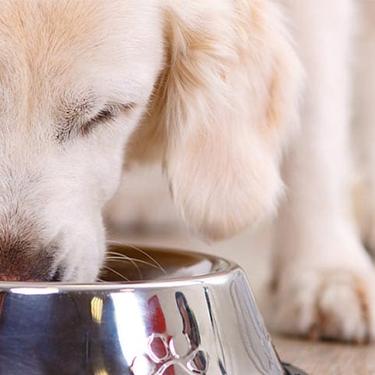
-
Find the right food for your pet
Take this quiz to see which food may be the best for your furry friend.
Find the right food for your pet
Take this quiz to see which food may be the best for your furry friend.
Featured products
 Adult Healthy Cuisine Roasted Chicken, Carrots & Spinach Stew Dog Food
Adult Healthy Cuisine Roasted Chicken, Carrots & Spinach Stew Dog FoodDelicious roasted chicken paired with tender vegetables in a succulent stew
Shop Now Small & Mini Savory Stew with Chicken & Vegetables Dog Food
Small & Mini Savory Stew with Chicken & Vegetables Dog FoodA delicious complement to the nutrition of Science Diet Small & Mini 7+ dog food
Shop Now Adult 7+ Perfect Digestion Chicken, Whole Oats & Brown Rice Recipe Dog Food
Adult 7+ Perfect Digestion Chicken, Whole Oats & Brown Rice Recipe Dog FoodScience Diet's breakthrough nutrition supports ultimate digestive well-being & healthy microbiome for dogs age 7+
Shop NowFeatured products
 Adult 7+ Tender Tuna Dinner Cat Food
Adult 7+ Tender Tuna Dinner Cat FoodWith delicious chunks in a decadent gravy
Shop Now Adult 7+ Senior Vitality Chicken & Vegetable Stew Cat Food
Adult 7+ Senior Vitality Chicken & Vegetable Stew Cat FoodImproves Everyday Ability to Get Up & Go
Shop Now Adult Savory Entrée Can Variety Pack Cat Food
Adult Savory Entrée Can Variety Pack Cat FoodPrecisely balanced nutrition with the delicious taste of savory minced chicken to help fuel the energy needs of cats during the prime of their life
Shop Now -
Dog
- Dog Tips & Articles
-
Health Category
- Weight
- Food & Environmental Sensitivities
- Urinary
- Digestive
- Joint
- Kidney
-
Life Stage
- Puppy Nutrition
- Adult Nutrition
- Senior Nutrition
Cat
- Cat Tips & Articles
-
Health Category
- Weight
- Skin & Food Sensitivities
- Urinary
- Digestive
- Kidney
-
Life Stage
- Kitten Nutrition
- Adult Nutrition
Featured articles
 Why Are Dogs and Cats So Cute?
Why Are Dogs and Cats So Cute?If waggy puppy dog tails and furry kitten yawns make you swoon, you're not alone. Why are cats so cute? And, dogs too! Let's find out!
Read More Does My Pet Hate Me?
Does My Pet Hate Me?Learn tips for bonding with your pet if you've ever thought, 'My dog doesn't like me, or 'Why do I have a standoffish cat?'
Read More Do Dogs and Cats have Belly Buttons?
Do Dogs and Cats have Belly Buttons?Learn whether cats & dogs have belly buttons like humans, what the function is, and if there are any health concerns associated with it.
Read More -


Can dogs eat almond butter and other almond-based treats? Almonds pack so much nutrition that they're considered a superfood for humans — but is the same true for dogs? Before you toss an almond to your pup for a treat, read on to learn important facts about dogs and almonds.
Can Dogs Eat Almonds?

Almonds are not considered a safe food for dogs. Although almonds aren't actually toxic to dogs, like macadamias and other nut varieties, they do pose a number of risks to your dog's health, says American Kennel Club (AKC). Here's how the consumption of almonds could potentially affect your dog:
- Gastrointestinal distress: Dogs can't properly digest almonds. While consuming one or two might not cause any issues, too many can lead to vomiting, diarrhea, gas, lethargy and appetite loss.
Pancreatitis: Almonds are high in fat content. While the occasional almond is unlikely to have much of an effect on your dog, too many can contribute to weight gain and cause your dog's pancreas to become inflamed, a serious condition that can severely impact your dog's health, says AKC.
Additional risks with seasoned almonds: Salt and other seasonings used on almonds prepared for human consumption can have adverse effects on your dog's health. Garlic and onion powder, for example, are both toxic to dogs.
Can dogs eat almonds in other forms? Certain processed almond products, like almond flour, which is finely ground almonds, and almond protein powder carry most of the same risks as whole almonds. Other almond-based treats, like almond bark, granola bars and baked goods containing almonds, might also contain ingredients like chocolate, raisins or artificial sweeteners that are toxic to dogs. But what about other types of almond products, like almond butter or almond milk?
Can Dogs Eat Almond Butter?
Processing almonds into almond butter increases the bioavailability of nutrients and makes them easier for dogs to digest, says Organic Facts. This means you're less likely to encounter any GI issues when feeding your pooch almond butter. However, other risk factors still persist. Too much almond butter, much like many other human foods, can still lead to pancreatitis. Also, many kinds of almond butter contain salt and artificial sweeteners like xylitol, which is toxic to dogs. If your dog accidentally laps up a lick of almond butter, they're likely not at risk. A better treat might be to give your dog natural peanut butter, which is considered safe and healthy for dogs in moderation. However, it should also be mentioned that natural peanut butter is high in fat content and has its own inherent health risks, so always check with your veterinarian before feeding food not specifically formulated for dogs. And always do so in moderation, as treats should never account for more than ten percent of their daily caloric content.


Tasty Tips
Can Dogs Drink Almond Milk?
Almond milk is a byproduct of processing almonds, and the concentration of almonds found in a cup of almond milk is highly diluted, says Dog Health Coach. As with almond butter, almond milk isn't likely to upset your dog's GI tract so some unsweetened, unflavored almond milk won't hurt them. However, dogs don't receive any nutritional benefit from almond milk, so you'll be giving them empty calories. And flavored, sweetened almond milk might contain — you guessed it — artificial sweeteners and other harmful ingredients. So overall, it's best to avoid giving your dog almond milk.
What to Do if Your Dog Eats Almonds
In most cases, one or two almonds or an illicit bite of almond butter is unlikely to harm your dog. Still, if your dog does consume almonds, keep a close eye on them and call your veterinarian if you notice signs of GI trouble. If your dog consumes more than a few almonds or an almond product containing other toxic ingredients, including other kinds of nuts, contact an emergency vet or a pet poison helpline right away to find out how to help your pup.
If you have any doubts or concerns about your dog's health after they've consumed almonds, it's always best to give your vet a call.


Jean Marie Bauhaus is a pet parent, pet blogger, and novelist from Tulsa, Oklahoma, where she usually writes under the supervision of a lapful of fur babies.
Related products
Related articles

Learn how today's wet dog food blends have gotten a face lift, and how you'll provide your dog the nutrition he needs in the form he loves.

Learn the the dangers of feeding your dog chocolate, which types are most dangerous, and what to do if you discover that they have consumed chocolate.

Proper nutrition for your pregnant or nursing dog is vital to her and her puppy's health. Learn what you should do provide her with the proper nutrients.

Learn about choosing the right dog food to help ensure your adult dog will receive the correct balance of nutrition.

Put your dog on a diet without them knowing
Our low calorie formula helps you control your dog's weight. It's packed with high-quality protein for building lean muscles, and made with purposeful ingredients for a flavorful, nutritious meal. Clinically proven antioxidants, Vitamin C+E, help promote a healthy immune system.
Put your dog on a diet without them knowing
Our low calorie formula helps you control your dog's weight. It's packed with high-quality protein for building lean muscles, and made with purposeful ingredients for a flavorful, nutritious meal. Clinically proven antioxidants, Vitamin C+E, help promote a healthy immune system.

